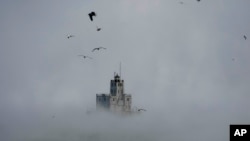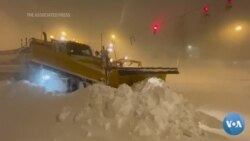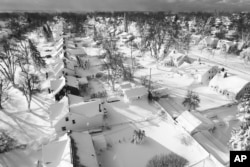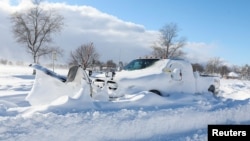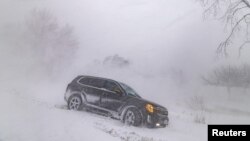Blizzard conditions continue to prevail on Monday in parts of the US Northeast, the stubborn remnants of a massive sprawl of extreme weather including severe cold that gripped the country over several days, causing widespread power outages, travel delays and at least 47 deaths nationwide.
The extreme weather forced the cancellation of more than 15,000 flights in recent days including more than 1,700 on Monday, according to tracking site Flightaware.com.
Numbing cold combined with howling winds and heavy "lake-effect" snow - the result of moisture picked up by frigid air moving over warmer lake waters - produced a storm that Governor Kathy Hochul said would go down in history as "the Blizzard of '22."
A crisis unfolded in the western New York State city of Buffalo where a blizzard left the city marooned, with emergency services unable to reach the worst-hit areas.
At least 25 people have died in western New York's Erie County, regional officials said Monday.
"In addition to the 13 confirmed deaths yesterday, the Erie County Department of Health medical examiner's office has confirmed an additional 12 deaths, bringing the total for the blizzard to 25 deaths county-wide," Erie County executive Mark Poloncarz said in a press briefing.
The governor called it an "epic, once-in-a-lifetime" weather disaster that ranked as the fiercest winter storm to hit Buffalo, New York state's second-largest city, since a crippling 1977 blizzard that killed nearly 30 people.
"It is [like] going to a war zone, and the vehicles along the sides of the roads are shocking," said New York Governor Kathy Hochul, a native of Buffalo, where 2.4-meter snow drifts and power outages have made for life-threatening conditions.
Hochul told reporters Sunday evening that residents were still in the throes of a "very dangerous life-threatening situation" and warned anyone in the area to remain indoors.
More than 200,000 people across several eastern states woke up without power on Christmas morning and many more had their holiday travel plans upended.
The extreme weather sent wind chill temperatures in all 48 contiguous U.S. states below freezing over the weekend, stranded holiday travelers with thousands of flights canceled and trapped residents in ice- and snow-encrusted homes.
Officials described historically dangerous conditions in the snow-prone Buffalo region, with hours-long whiteouts and bodies discovered in vehicles and under snow banks as emergency workers struggled to search for those in need of rescue.
The city's international airport remains closed until Tuesday and a driving ban remained in effect for all of Erie County.
"We now have what'll be talked about not just today but for generations [as] the blizzard of '22," Hochul said, adding that the brutality had surpassed the region's prior landmark snowstorm of 1977 in "intensity, the longevity, the ferocity of the winds."
Hochul told reporters on Sunday that the Biden administration had agreed to support her request for a federal disaster declaration and she expected formal approval shortly.
Due to frozen electric substations, some residents were not expected to regain power until Tuesday, with one frozen substation reportedly buried under 18 feet of snow, a senior county official said.
'Conditions are just so bad'
The National Weather Service warned that blizzard conditions in western New York's Great Lakes region caused by lake-effect snow was continuing Sunday, with "additional snow accumulations of 2 to 3 feet through tonight."
One couple in Buffalo, across the border from Canada, told AFP Saturday that with the roads completely impassible, they would not be making a 10-minute drive to see their family for Christmas.
"It's tough because the conditions are just so bad... a lot of fire departments aren't even sending out trucks for calls," said 40-year-old Rebecca Bortolin.
A broader travel nightmare was in full effect for millions.
The storm, one of the fiercest in decades, forced the cancellation of nearly 3,000 US flights on Sunday, in addition to some 3,500 scrapped Saturday and nearly 6,000 Friday, according to tracking website Flightaware.com.
Travelers remained stranded or delayed at airports throughout Christmas Day including in Atlanta, Chicago, Denver, Detroit and New York.
Road ice and white-out conditions also led to the temporary closure of some of the nation's busiest transport routes, including the cross-country Interstate 70.
Drivers were being warned not to take to the roads — even as the nation reached what is usually its busiest time of year for travel.
The extreme weather has severely taxed electricity grids, with multiple power providers urging millions of people to reduce usage to minimize rolling blackouts in places like North Carolina and Tennessee.
At one point on Saturday, nearly 1.7 million customers were without electricity in the biting cold, according to tracker poweroutage.us.
The figure dropped substantially by Sunday night, although more than 48,000 customers in eastern states still lacked power.
This report was prepared using data from Reuters and Agence France-Presse.




